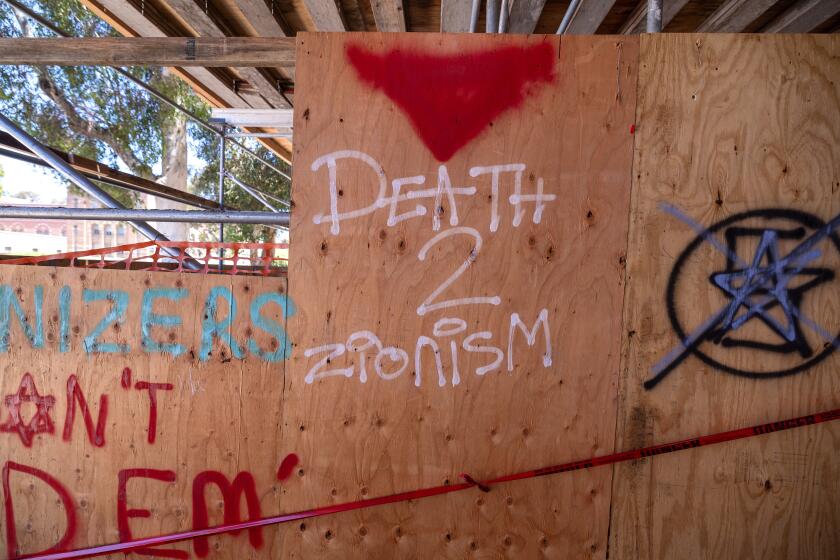Hospital Assails County Fight Against Measure
The fight over the county’s $225-million tobacco settlement reached a new level of hostility Wednesday when Community Memorial Hospital warned elected officials they may face legal sanctions if they continue campaigning against a ballot initiative that would give the money to private health care providers.
The hospital’s lawyers sent a letter to the county, criticizing the Board of Supervisors for meeting in a closed session to decide to pursue legal action to block the hospital’s proposed initiative. The board also agreed to place a counter-initiative on the November ballot if necessary.
The board’s actions and comments “give us great concern that the board has acted, and is contemplating acting in the future, beyond its legal powers,” said the letter, which was signed by James R. Parrinello, a lawyer with the Mill Valley firm of Nielson, Merksamer, Farrinello, Mueller & Naylor.
The letter warned that state law forbids the county from spending public money to campaign in favor of, or against, a ballot measure. The letter also accused the board of violating the Ralph M. Brown Act, which governs what issues an elected body may discuss in private.
County officials reacted swiftly to the letter, which they characterized as a replay of scare tactics used by the hospital in a 1996 campaign to block construction of a new wing at the county hospital. One supervisor fumed that he would risk jail rather than be silent about the hospital’s plan.
The hospital’s proposed ballot measure would take the entire projected tobacco settlement and turn it over to private health care providers, such as Community Memorial. Supervisors want to spend the settlement, which will be paid out over 25 years at $9 million a year, on its own health care programs.
While the letter suggests the board violated the Brown Act, it stops short of saying the hospital would sue officials over the private meeting Tuesday.
Instead, it is simply “a reminder to supervisors of their responsibilities under the law,” said hospital spokesman Mark Barnhill. “Beyond that, it would be premature to say what any course of action would be.”
Supervisors reached Wednesday dared the hospital to take its warning a step further.
“They’re not going to stop me from speaking publicly because I’ll go to jail,” said Supervisor Frank Schillo. “I’m going to tell the whole story on Community Memorial. I have 1st Amendment rights.”
Supervisor John K. Flynn said the board has “every right to go into closed session to discuss potential lawsuits and personnel matters, and that’s what we were in closed session for.”
Flynn said the board was frightened into submission in 1996, when the hospital issued similar warnings to block construction of a $51-million outpatient clinic at Ventura County Medical Center. The medical center is the county’s public hospital and a source of competition for Community Memorial.
*
In a $1.6-million campaign, Community Memorial placed a measure on the ballot seeking to stop the project, and voters approved.
“We will not have CMH put the fear into us like they did last time,” Flynn said. “I think they did scare us last time because we weren’t used to such a mean-spirited, untruthful campaign. We have a responsibility to protect the public interest, and that’s what we’ll do.”
Assistant County Counsel Noel Klebaum said the letter was merely a scare tactic and had no merit. “There weren’t any Brown Act violations in the board’s closed session,” Klebaum said.
“The typical practice of CMH’s advisors is to try to intimidate whoever is on the other side,” he said. “I’m sure they’d like us to cease and desist from in any way opposing CMH, but of course that is not the instruction of the board.”
Meanwhile, the two sides also squabbled over how the money would be divided up if the hospital initiative passes this fall.
An analysis by county Health Care Agency Director Pierre Durand shows that only three of the seven general hospitals in the county would benefit from tobacco settlement money. One is Community Memorial.
The other two are Los Robles Regional Medical Center and Simi Valley Hospital. According to the analysis, the three would divide up an estimated $6 million annually. The other $3 million would go to such things as immunizations and at-home nursing care programs.
Ojai Valley Community Hospital, St. John’s Regional Medical Center, St. John’s Pleasant Valley Hospital and Santa Paula Memorial Hospital would receive no funding, according to the county analysis.
Community Memorial officials dispute the county’s figures, and say only one hospital, Ojai, would not receive any tobacco money, because it doesn’t treat enough indigent patients.
The payout plan also would exclude Ventura County Medical Center, which treats 83% of indigent patients countywide. Community Memorial says that’s fair, because the county medical center receives about $40 million a year from taxpayers for indigent care, while the other hospitals receive nothing.
But county officials dispute that. Community Memorial, a nonprofit hospital, receives tax breaks so it can afford to provide some indigent care, said Supervisor John Flynn.
“If they took care of a patient who is an indigent, then they [already] were paid for services,” said Flynn.
*
Barnhill dismissed the county’s analysis, saying it was based on erroneous information.
“I’m not sure what they’ve done with the formula, or where they’re getting their numbers, but they’re off,” Barnhill said.
Barnhill said Community Memorial consulted with other Ventura County hospital officials in devising its formula.
“The purpose of the formula was to get to as true a number as we could to determine how much is spent to treat the indigent, the working poor,” Barnhill said.
Flynn said he believes the hospital’s initiative is unconstitutional because it violates the terms of the settlement between the federal government and tobacco companies that gives the county authority to spend the money.
But Barnhill said the ballot initiative is intended to give the people the power to decide how the money is spent, instead of relying on a county government that is already being penalized for fiscal mismanagement.
“It’s a question of taking a look at how indigent care is paid for in the county,” Barnhill said. “The supervisors seem to want to assert that the voters don’t have the right to make that decision.”
More to Read
Start your day right
Sign up for Essential California for news, features and recommendations from the L.A. Times and beyond in your inbox six days a week.
You may occasionally receive promotional content from the Los Angeles Times.






